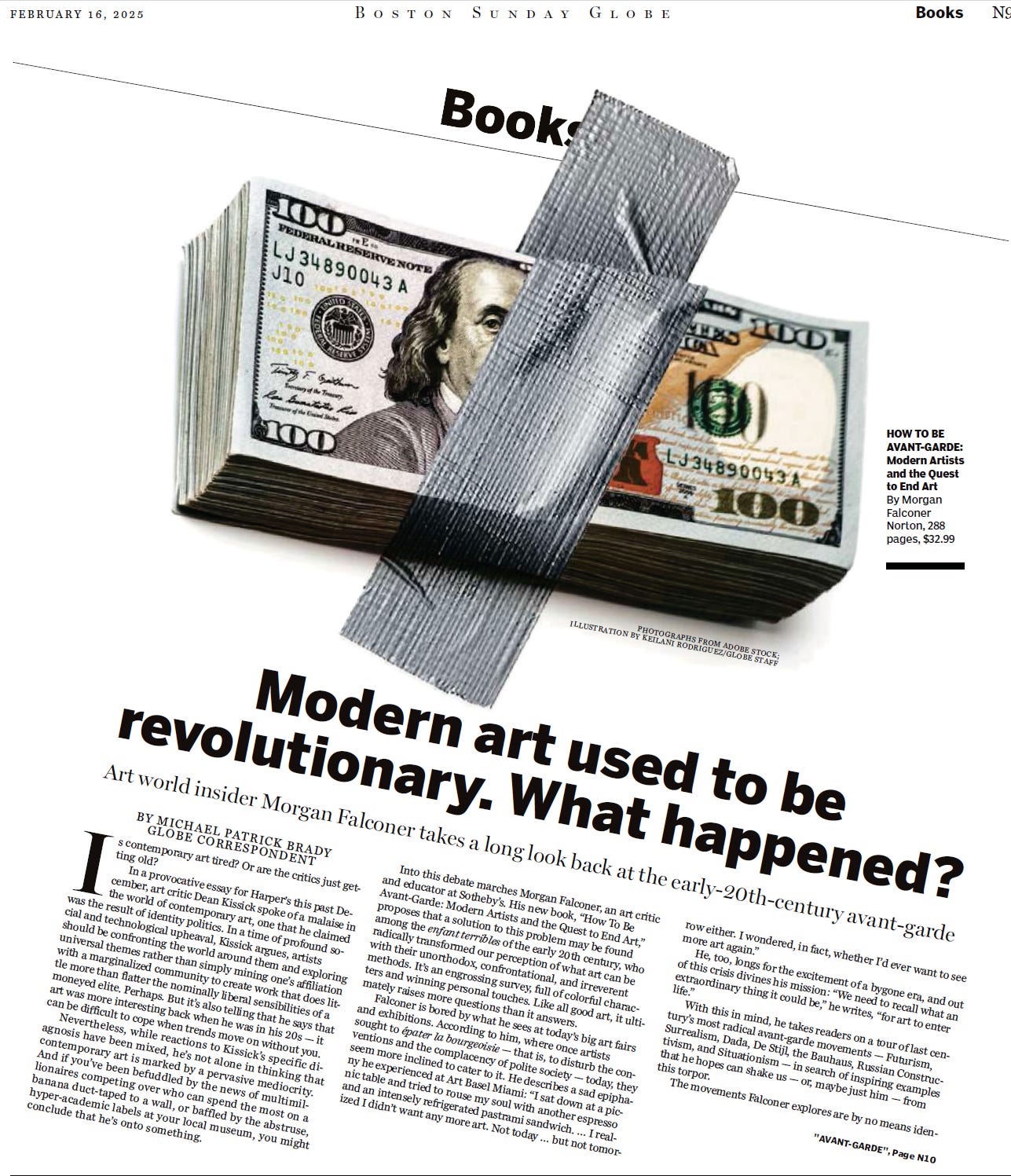Reviews: New books this March
John Broderick’s The Pilgrimage, Jean Echenoz’s Command Performance, and more.
I know I’ve picked up a number of new subscribers in recent weeks, so allow me to introduce myself.
First off, I’m a book critic and writer from Boston. For many years, I've contributed reviews to publications including The Boston Globe, The Washington Post, and The Millions, among others. These days, I’m writing most frequently at WBUR.org.
I also write short fiction, which has appeared in journals such as Smokelong Quarterly, Cheap Pop, and Bull.
I'm currently querying my first novel. Wish me luck.
Oh, and I’m a two-day Jeopardy! champion.
I get a lot of galleys but only so many opportunities to write about them. So anything I feel strongly about but can’t manage to place in one of my regular outlets is going to show up here. Plus, I’ve got about 22 years of arts coverage to draw from—I’ll be showcasing highlights from my personal backlist every so often.
This week, I’ve got three capsule reviews of new March releases, links to my recent work at the Boston Globe and WBUR.org, and a peek at what I’m looking forward to in April.
Thanks for reading!
The Pilgrimage by John Broderick
(McNally Editions, March 4; Originally published in 1961)
Banned in Ireland upon its release in 1961, John Broderick’s The Pilgrimage is an unflinching examination of mid-century Irish hypocrisy. Julia Glynn is a woman trapped in a gilded cage, tangled up in a loveless marriage with her wealthy, closeted, much-older husband Michael and carrying on an affair with Michael’s nephew Jim. Michael is disabled and is tended to by his taciturn manservant, Stephen, whose sphinx-like presence in the household unnerves Julia.
At the onset of the novel, Michael is planning a pilgrimage to Lourdes in the hopes that the holy waters there will cure his disability. Julia, Michael, and Stephen, are expected to come along.
But before the trip commences, Julia receives a series of anonymous letters on distinctive blue paper. Someone has found out about her affair with Jim and is threatening to reveal all. Gripped by paranoia, Julia desperately searches for clues to who is behind the letters while grappling with her own stifled desires for love, sex, and freedom in a deeply repressed and unforgiving country.
Broderick’s Ireland is populated with “narrow-minded, money-grubbing, hypocritical, furtive” people, an amorphous, judgmental mass from which Julia sees no escape. Her life is one of spiritual, emotional, and physical confinement, and the pressure it exerts on her is profoundly crushing.
She was chained to the house, as effectively as if she were imprisoned. It was the second time that day that she had thought of herself as imprisoned. Suddenly it seemed to her, as she felt her bony skull beneath the pressure of her fingers, that she was just as effectively imprisoned in the house of the flesh.
The Pilgrimage deftly illustrates the psychological toll of being forced to live a lie, to deny one’s desire so completely that you lose your sense of self entirely. It’s a troubling, turbulent book—part social satire, part Hitchcockian thriller. But still, Broderick can’t help but end it with a tragically hilarious denouement that is quintessentially Irish. I literally laughed out loud at the last page. Highly recommended.
Holy Men of the Electromagnetic Age by Raphael Cormack
(W.W. Norton, March 11)
Holy Men of the Electromagnetic Age explores the popularity of the occult in the aftermath of the First World War primarily through the stories of two of its most successful practitioners, the faux fakir Tahar Bey, who dazzled credulous Western audiences with a magic show he claimed was based on Eastern mysticism, and the mysterious Dr. Dahesh who introduced hypnotism to the Middle East in the 1940s and put a modern, pseudoscientific gloss on his psuedo-spiritual performances.
Cormack shows how the transformative technological innovations of the early 20th century, coupled with the disillusionment and shock of the war, created an environment in which people were both primed to believe in miracles and desperate for new ways of making sense of the world. He also posits that this may have set the stage (or at least presaged) the ensuing rise of fascism:
The fakirs and the demagogues were diagnosed as symptoms of the same disease—the descent into irrationality and superstition that defined the 1920s and 1930s. As the old order, built on logic and materialism, collapsed, lost souls were drawn to outlandish promises and miraculous worlds, whether that was the mystics who wanted to build a new world on foundations of the occult or far-right dictators who raved about national rebirth or the "Jewish threat."
(On that note, you may want to check out my recent review of Rebecca West’s Radio Treason.)
Deeply researched and told with a cinematic, narrative sweep, Cormack’s book is an engaging read and a fascinating look into a forgotten fad that has parallels in today’s political demagoguery and technological charlatanry.
Command Performance by Jean Echenoz
(Translated from the French by Mark Polizzotti. NYRB, March 11)
Gérard Fulmard is a hapless loser. An unemployed, middle-aged flight attendant, he is mediocre in every way—physically, intellectually, emotionally. And he knows it. But he doesn’t let it get him down. At least, not too much. On a lark, he decides to place an ad for himself in the paper, styling himself as a private detective, in the hopes of making a little cash and finding a little excitement to break up his otherwise banal life. But things quickly spiral out of control—he’s framed for murder, gets caught up in the machinations of a fringe, far-right political party, and is compelled to work first a spy and then an assassin.
Echenoz is a well-known writer in France, and I suspect that he’s excellent at sending up the specifics of contemporary French culture and politics—but I can only suspect it, because I don’t know enough about contemporary France to recognize it, at least not in full. I know enough to detect that the IPF, the fringe political party Fulmard becomes involved with, is modeled after Marine Le Pen’s National Rally, but I’m pretty certain that most of the more enlightening (and funny) nuances of his satire have unfortunately passed me by.
Which is a shame, because the opening chapters, in which Fulmard holds the stage, are exciting. He’s a quirky character with a jaundiced wit. And Echenoz’s playful style—shifting perspectives; glib, metafictional narration; form-breaking prose—certainly keeps things interesting. But the political intrigue (it might be a stretch to call it “intrigue,” honestly) is laid on a little too thick in the middle of the book; when Fulmard was out of view, I struggled to stay interested.
If you are looking for more reviews of recently released books, you might want to check out February’s digest, which included reviews of Maggie Sarsfield’s Beta Vulgaris, Sonya Walger’s Lion, and Nick Newman’s The Garden, or January’s digest, which featured books from Dino Buzzati, Antonio Di Benedetto, and Sara Sligar.
Recently reviewed elsewhere
I covered two engrossing, art-centric books in February:
How To Be Avant-Garde: Modern Artists and the Quest to End Art by Morgan Falconer
(W.W. Norton, February 18)
Art is a never-ending dialectic between a disruptive, revolutionary spirit and an anesthetizing bourgeois sensibility that seeks to blunt the cutting edge. Kissick and Falconer argue that the pendulum has swung too far in one direction and a rebalancing is in order. To put it simply: Art needs antagonists. But it’s important to be clear about who exactly we should be antagonizing. Pinning the blame on identity politics lets the institutional-curatorial complex that has co-opted a genuine concern for marginalized voices to its own commercial ends off the hook, and risks inviting a reactionary backlash that would only serve to validate bad-faith culture-war grievances.
As a side note, this review was featured on Arts & Letters Daily last month:
Arts & Letters Daily has been my browser homepage since high school, and the articles I've found there have had a profound impact on my reading, writing, and thinking. So I'm overwhelmed and incredibly grateful to find my own work featured there. I’m not kidding when I say this has been a life goal of mine—it’s literally on a list of my life goals, and I actually got to cross it off. Pretty satisfying.
Read my review at The Boston Globe.
From Ted to Tom: The Illustrated Envelopes of Edward Gorey by Edward Gorey
(Edited and with an introduction by Tom Fitzharris, NYRB, February 4)
One can see the amount of thought and effort Gorey is pouring into these miniature masterpieces expanding as time goes on. Looking at the elaborately designed envelopes, you have to wonder what the humble clerk at the Barnstable post office must’ve thought when processing them, forced by law to spoil them with a postmark. (“As to the postmarks, look at it this way,” Gorey wrote to Fitzharris, “They add a Proustian dimension of time.”) On occasion, the project seemed to weigh on Gorey. ”I still haven’t done the envelope,” he typed on August 26, 1974. “Time is passing. None of us is/are getting any younger. What does it all mean? We are temporarily out of oreos. Oh God.”
And if you’re looking for more writing about artists, I’ve got you covered, with a look back at six of my favorite gossipy art books, plus a brief preview of 2025 art-related titles I’m interested in.
Stray thoughts
I read Federico Perelmuter’s “Against High Brodernism” in the Los Angeles Review of Books, and my main takeaway was that the books he’s describing sound pretty cool and I should probably check them out.
I read ’s piece at , “Would You Have Rather Married Young?” and my response is basically… It depends. Obviously, if the path you chose didn’t work out to your liking, you’re going to idealize the alternative. But there’s no reason to assume that would’ve worked out any better. There’s a reason “the grass is always greener” is such a durable adage. The real solution: Marry at the exact right age, neither too young nor too old, like I did. It worked out wonderfully.
Argentine writer and personal favorite Andrés Neuman wrote about Kafka over on the FRANZ Substack. I’m a big fan of Neuman’s work, having reviewed his extraordinary Traveler of the Century for the Boston Globe back in 2012.
People have been talking about Patricia Lockwood’s style. I only know her from her writing in the LRB, but I will say that I went from “Oh, that’s an interesting approach” to “Ugh, not this again” in the span of four our five columns. Recently, she reviewed Simon Critchley’s On Mysticism, and made a reference to a “Dan Flashes shirt.” How acquainted with I Think You Should Leave is the typical LRB reader? I’m trying to imagine Perry Anderson making sense of this. Inquiring minds want to know.
So I cracked open a galley for a nonfiction book from a major publisher that’s due to come out in May, and on page 2, staring me right in the face, was an egregious and unambiguous factual error. Obviously, they have a little time to fix it—I may even try and flag it for them myself. But I don’t think I’ll be able to keep reading if that’s the level of attention to detail the author is bringing to the table. That said, I may end up revisiting this more thoroughly in a future letter.
Do yourself a favor and scroll through this lengthy compendium of cutaway house illustrations for a few hours.
Upcoming reviews
Next week at WBUR.org: An interview with Joyce E. Chaplin about her new book, The Franklin Stove: An Unintended American Revolution (FSG, March 11). A social, political, and economic history of staying warm.
March 11th on Substack: Vincenzo Latronico’s Perfection (NYRB, March 18). The discreet charm of the bohemian bourgeoisie. Longlisted for the International Booker Prize!
In April for The Boston Globe: Terrestrial History by Joe Mungo Reed (W.W. Norton, April 8). One planet, two planets, red planet, dead planet.
What I’m reading for April
The King of a Rainy Country by Brigid Brophy (McNally Editions, April 1)
Adventures in the Louvre by Elaine Sciolino (W.W. Norton, April 1)
Authority by Andrea Long Chu (FSG, April 8)
Atavists by Lydia Millet (W.W. Norton, April 22)
Let Me Tell You and Let Me Go On by Paul Griffiths (NYRB, April 22)














Best part is that it’s Alain de Botton wearing the Dan Flashes shirt